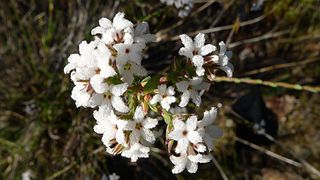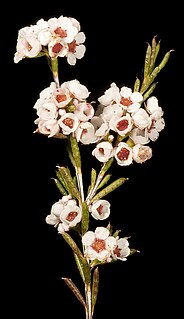
Leucopogon is a genus of about 150-160 species of shrubs or small trees in the family Ericaceae, in the section of that family formerly treated as the separate family Epacridaceae. They are native to Australia, New Zealand, New Caledonia, the western Pacific Islands and Malaysia, with the greatest species diversity in southeastern Australia. Plants in this genus have leaves with a few more or less parallel veins, and tube-shaped flowers usually with a white beard inside.
John William Green is an Australian botanist.
Aphanocalyx microphyllus subsp. compactus is a tropical rainforest tree in the family Fabaceae. This subspecies is endemic to the western Guinean lowland forests of Ivory Coast, Liberia, and Sierra Leone. The nominal subspecies Aphanocalyx microphyllus subsp. microphyllus occurs in the rainforests of central Africa.

Chamelaucieae is a tribe of flowering plants within the family Myrtaceae, mostly from Australia, with a few species in New Caledonia and south-east Asia.

Leucopogon microphyllus is a small Australian plant in the family Ericaceae native to eastern Australia. Two varieties are recognised, distinguished principally by leaf hairiness and geographical distribution. Leucopogon microphyllus var. microphyllus (Cav.) R.Br. is widespread and relatively common in heathlands of coastal eastern New South Wales and south eastern Queensland. Leucopogon microphyllus var. pilibundus Benth. is found at higher altitudes on the eastern ranges of New South Wales and Victoria, and has leaves with long hairs on both the upper and lower surface. Neither variety is considered threatened.

Malleostemon is a genus of flowering plants in the myrtle family Myrtaceae, described as a genus in 1983, by John Green The entire genus is endemic to Western Australia.
- Malleostemon costatusRye & Trudgen
- Malleostemon decipiens(W.Fitzg.) Trudgen
- Malleostemon hursthousei(W.Fitzg.) J.W.Green
- Malleostemon microphyllusRye & Trudgen
- Malleostemon minilyaensisJ.W.Green
- Malleostemon nephroideusRye
- Malleostemon nerrenensisRye & Trudgen
- Malleostemon pedunculatusJ.W.Green
- Malleostemon peltiger(S.Moore) J.W.Green
- Malleostemon pustulatusRye
- Malleostemon roseus(E.Pritz.) J.W.Green
- Malleostemon tuberculatus(E.Pritz.) J.W.Green
- Malleostemon uniflorusRye
Malleostemon decipiens is a plant species of the family Myrtaceae endemic to Western Australia.
Malleostemon hursthousei is a plant species of the family Myrtaceae endemic to Western Australia.
Malleostemon costatus is a plant species of the family Myrtaceae endemic to Western Australia.
Malleostemon minilyaensis is a plant species of the family Myrtaceae endemic to Western Australia.
Malleostemon pedunculatus is a plant species of the family Myrtaceae endemic to Western Australia.
Malleostemon peltiger is a plant species of the family Myrtaceae endemic to Western Australia.
Malleostemon nephroideus is a plant species of the family Myrtaceae endemic to Western Australia.
Malleostemon nerrenensis is a plant species of the family Myrtaceae endemic to Western Australia.
Malleostemon pustulatus is a plant species of the family Myrtaceae endemic to Western Australia.
Malleostemon roseus is a plant species of the family Myrtaceae endemic to Western Australia.

Malleostemon tuberculatus is a plant species of the family Myrtaceae endemic to Western Australia.
Malleostemon uniflorus is a plant species of the family Myrtaceae endemic to Western Australia.

Leionema microphyllum, commonly known as limestone phebalium, is a small shrub with terminal clusters of white-pink flowers in spring. It is a rare plant in Victoria and South Australia.
Cyananthus microphyllus, called the small-leaved bluebell-flower, is a species of flowering plant in the genus Cyananthus, native to the western Himalayas, Nepal, and Tibet. It has gained the Royal Horticultural Society's Award of Garden Merit.





